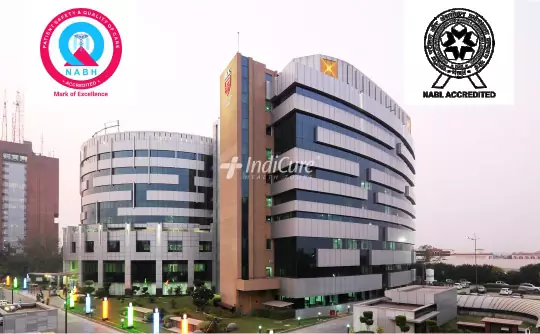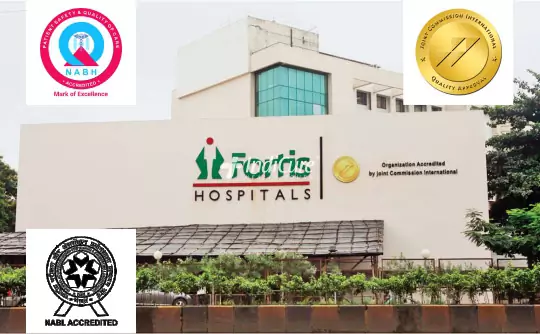

Endoscopic Spine Surgery Cost in India starts from US $5,200 and varies depending on which area of the spine needs to be treated, your medical history and comorbidities, surgeon, hospital and the city where you choose to get the surgery done.
Endoscopic spine surgery can be done to treat cervical/thoracic or lumbar spine. The cost varies with the area that needs to be treated and how complex the procedure will be. It also varies with your health condition and if you have any other medical issues.
An important expense when it comes to your minimally invasive surgery is going to be your spine surgeon's fees. IndiCure recommends experienced, skilled, board-certified surgeons who are capable of delivering successful spinal fusion surgeries. Although the charges may vary depending on the experience of the surgeon, you can be assured to be in safe hands when you choose spine surgery in India with IndiCure.
The use of any customized surgical instruments or specialized computer technology also affects the cost. With the hopes of improving patient care, new techniques and technologies are often introduced to the surgical process. Such innovative advancements in the surgical approach can increase costs.
Having your endoscopic spinal surgery in an accredited surgical facility by skilled and qualified medical staff is a critical factor. Moreover, the geographical location of this facility also affects the quote. But, IndiCure provides you with a projected estimate that will be all inclusive and affordable.
The surgery-related expenses include the pre- and post-surgical expenses. The pre-surgical expenses are associated with the age and medical condition of the patient and thus the number and type of investigations required. Post-surgical expenses may include prescription medications, physical therapy, and follow-up consultations.
We at IndiCure, understand that you travel with a budget in mind and do not like to be greeted by surprises after arrival in India. We thus club all these expenses and give you the package cost that is inclusive and affordable at the same time.
Your case manager shall give you an estimated cost of your surgery after discussing your medical reports with the surgeon. The final cost, however, shall be confirmed after your consultation with the Surgeon.
In fact, we have Special Negotiated Rates with the Hospitals and you can avail Discounted Rates when you choose to Travel with IndiCure.


We Help you Choose the Right Treatment, Surgeon & Hospital

We Arrange Video/Telephonic Consultation with the Surgeon

We Assist you with Visa & Accommodation

We Receive you at the Airport and Drop you at Hotel/Hospital

We Assist you the at Hospital & Provide Post Operative Support
Endoscopic spine surgery, also known as Minimally Invasive Spine Surgery, or Minimal Access Spine Surgery is regarded as ground breaking, since it successfully treats the whole spectrum of spinal disc anomalies with minimal muscle damage and minimal recovery time.
Similar to conventional surgery, the main objective of minimally invasive spine surgery (MISS) is to stabilize the vertebrae and decompress the pinched nerves in order to reduce pain and eliminate unpleasant symptoms by reducing pressure on the nerves brought on by herniated discs, spinal stenosis, bone spurs, or tumors.
However, minimally invasive spinal surgery provides a quicker, safer, and less painful alternative. The surrounding muscles and other nearby tissues suffer significantly less interventional harm. Additional benefits of minimally invasive methods over traditional spine surgery include:
Conditions that can be treated with Minimally invasive/Endoscopic spine surgery.
The common conditions causing back/neck pain that can be treated by minimally invasive spine surgery includes:
People who are not responding to non-surgical treatments including painkillers, nonsteroidal anti-inflammatory medications, and physical therapy, have back pain, numbness, or paralysis in their upper or lower limbs are candidates for minimally invasive spine surgery.
If there are signs of pressure on the spinal cord or the cauda equina, or if there are cases of significant or worsening paralysis, surgery for herniated discs should be considered an emergency.
In cases when symptoms have not subsided after six weeks of conservative treatment, such as medication, injections, and physical therapy, surgery is considered as the last option. In order to relieve pressure on the spinal cord, the prolapsed portion of the disc will be removed during surgery.
We at IndiCure completely understand your concerns and it is always our endeavor to provide the best outcome for every patient. Following is the list of questions you must ask before you embark on your journey for endoscopic spine surgery in India.
Prepare to answer questions about your:

Medical devices known as tubular retractors are used during MISS fusion and decompression procedures. MISS can reduce soft tissue trauma in a number of ways. These consist of:
This technique distends the soft tissues rather than cuts them, lowering the risk of injuring the muscle.
This strategy minimizes pain and muscle stress by doing the surgery from the side.
This technique, which requires a number of tiny incisions, is employed when a frontal approach is required.
are used to support, immobilise, and aid in vertebral fusion with this technique. With the use of guidewires, it is accomplished.
The tubular retractor is passed through the skin and soft tissues of the first step and down to the spinal column through a tiny incision. This makes a tunnel to the tiny spot in the spine where the issue is located. The tubular retractor is retained in place during the process and holds the muscles open rather than cutting them.
The surgeon inserts tiny instruments through the center of the tubular retractor to gain access to the spine. The retractor is used to insert any fusion-related devices, such as screws or rods, as well as to remove any excised bone or disc material.
The tubular retractor is taken out at the end of the process, and the muscles reposition themselves. As a result, the muscular injury that results from open procedures is less common.
The success rates for minimally invasive spine surgery are very high. The majority of patients notice significant and long-lasting improvement in their back. In up to 90% of patients, it helps to reduce the signs and symptoms of herniated or slipped discs.
Every patient's recovery is different. On the other hand, it is typical to experience discomfort at the site of the operation for the first few days. This pain can be managed with medicine. After a week following surgery, physical rehabilitation would be encouraged to begin. While you could resume your regular activities in approximately two weeks, a full recovery might take many weeks to months. Your medical professional will give you guidance on the rehabilitation process and when to begin strenuous exercises.

New Delhi
BL Kapur Memorial Hospital is one of the biggest standalone private hospitals in Delhi, NCR. Established by late Dr. B L Kapur, an eminent Obstetrician, and Gynecologist on invitation by then Prime Minister of India, Mr. Jawahar Lal Nehru. The institute went on to become one of Delhi's premier multi-specialty hospitals.

Mumbai
Fortis Hospital, Mulund is a 300 bedded multispeciality tertiary care facility situated in the centre of the city, offering a range of clinical, diagnostic, and surgical services. The hospital began operations in 2002 and since then has achieved various milestones. The hospital is a JCI and NABH accredited facility and among very few hospitals to have NABH accreditation for Blood bank and NABL for Pathology Laboratory.
Not all patients qualify for a minimally invasive procedure. There are definite instances in which minimally invasive surgery is appropriate and when it should be avoided for safety reasons. Every procedure needs to be tailored to the patient and the technology. Your spine care team may determine during your examination that other treatment options should be attempted first before surgery is ever considered, though.
Adverse reaction to anesthesia, infection, and blood loss are the risks associated with minimally invasive spine surgery like all other surgeries. Damage to the nerves, pain from the surgery and leakage of spinal fluid are some of the risks associated with the spine surgery itself.
Endoscopic spine surgery is a cutting-edge approach of minimally invasive spine surgery created to give the patient a faster recovery period and less pain than standard spine surgery techniques.
The success rate of endoscopic spine surgery is great. 80 to 90 percent of our patients experience less pain and greater mobility following surgery. You will eventually be able to pick up some of the activities you previously had to forgo because of your spinal ailment.
Patients who are suitable candidates typically need a decompression of the spinal nerves, increased spine stability, and a deformity correction. There are some spine infections and tumors that cannot be treated with a minimally invasive method.
The hospital stay after minimally invasive spine surgery in India is usually 3-4 days. You would need to stay for another 7-10 days in India before you can go back. You thus need a total for 2 weeks for minimally invasive spine surgery in India.
Enhance your medical journey to India by availing these extra services.
Traveling abroad for medical reasons may be challenging. With our experience of over a decade and working with the best surgeons and top hospitals in India, we help make your medical tour easier and safer for you. We will guide you at every step of the way and make end-to-end arrangements for your surgery, travel, and stay.
Ramandeep Dhaliwal
I had great experience having rhinoplasty through Indicure. Dr. Ruchika from Indicure has helped me in finding best plastic surgeon, answering all my questions...
Read More
Joshua Archer
My name is Joshua Archer I'm from New Zealand, bay of plenty, kawerau I opted for the bypass surgery in January 2023 but planned it in advance for 28 September found IndiCure...
Read More
Kera Ren
Absolutely loved my experience with IndiCure - from first inquiring to meeting the surgeon pre op to my follow up post op. The surgeon was extremely approachable...
Read More
Andreana Paul
Had a wonderful experience. Visited India for my plastic surgery. From sending mails, airport pickup, comfortable accommodation and, to smooth hospital appointment booking...
Read More
Brandi Luce
I had the privilege of using Indicure's services for a cosmetic procedure that I had wanted for a long time but had always been apprehensive about. Ruchika helped me...
Read More
Jade M
Indicure Health Tours went above and beyond my expectations. They helped me with every aspect of my journey and were professional, kind and caring. I was...
Read More
The content on the website (www.indicure.com) is intended to be general information and is provided only as a service. All photographs on our website of before and after results are examples only, and do not constitute an implied or any other kind of certainty for the result of surgery.
Learn about IndiCure Health Tours' comprehensive editorial policy that strives to deliver trustworthy, helpful, relevant, accurate and people-first content on medical tourism in India.
It is not medical advice and should not be taken as medical advice. It should not be used to diagnose or treat a health condition and is in no way meant to be a substitute for professional medical care. You are advised to see a surgeon in person to assess what surgery may or may not accomplish for you.
It is also important to keep your expectations realistic and to understand that all surgical procedures carry risks and should never be taken lightly.